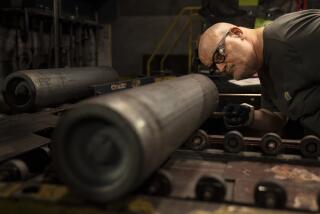U.S. Reports Soviet Decline in Economy : More Austerity for Consumers, Impact on Weapons Seen
- Share via
WASHINGTON — The Soviet economy slumped badly last year, and the short-term prospects for resumed growth are not favorable, apparently dooming consumers to continued austerity and perhaps even retarding the development of new weapons, U.S. intelligence agencies reported Sunday.
The CIA and the Pentagon’s Defense Intelligence Agency, in their annual report to Congress, said the economic squeeze may explain Moscow’s interest in negotiating an arms control treaty with the United States that could reduce the cost of the arms race.
The report said that the economic reforms instituted by Soviet leader Mikhail S. Gorbachev have failed to produce their intended results. In many cases, the report said, the reforms may have damaged economic production by introducing changes that the economy was not ready to absorb.
‘Real Loser’ Is Consumer
“The real loser in 1987 appeared to be the consumer, who, now three years into Gorbachev’s economic program, has seen almost no increase in his standard of living,” the report said.
The report concluded that the Soviet economy has slipped backward toward the kind of stagnation that existed before Gorbachev took power, something that could create political and social problems for the Kremlin.
” . . . We believe that if the economy continues to perform poorly in the next few years, tension within society and the leadership will increase,” the report said.
Commenting on the report, Sen. William Proxmire (D-Wis.), chairman of the congressional Joint Economic Committee, pointed out that the Soviet Union had enjoyed an encouraging rise in economic growth in 1986 and said that 1987’s economic reversals do not mean that Gorbachev’s reform program is doomed or that the Soviet leader is in political difficulty.
Reserves Judgment on Reforms
“Soviet economic performance was as impressive in 1986 as it was disappointing in 1987, and the economy seems to be doing better so far this year,” said Proxmire, whose committee commissioned the report. “It is still too soon to pass judgment on the reforms or on Gorbachev’s leadership.”
The report said that “almost all sectors of the economy (in 1987) failed to match the gains achieved in 1986.”
” . . . Industrial growth dipped to 1.5% . . . (and) agricultural output was down 3% from 1986’s record level,” it said.
“The short-term outlook for growth certainly is not good,” the report added. “Meeting the targets established for the 1988 plan, for example, would require Soviet GNP (gross national product) growth of nearly 8%. This seems clearly beyond reach. Given the disruptions that Gorbachev’s programs are causing and are likely to continue causing for the next few years, we project average annual growth of 2% or less for the rest of this five-year plan,” which runs through 1990.
For the time being, at least, the report predicted that Gorbachev would try to maintain Soviet defense spending, which currently claims between 15% and 17% of the GNP, a much higher share than in other industrialized nations.
“National security is a particularly sensitive area for the leadership, and Gorbachev probably would be reluctant to leave himself open to charges of weakening Soviet defenses by pushing reforms or resource shifts that many in the military leadership oppose,” the report said.
Nevertheless, it said, Gorbachev’s goals for civilian industrial growth almost certainly will require diverting some resources from the defense sector.
Future Weapons Programs
“Any investment forgone in weapons plants to supply tooling for civilian production could delay the introduction of future weapons programs but would not be likely to slow current output,” the report said.
It added that “defense industrial participation in the civil modernization program is unlikely to affect weapons production capabilities, at least for the next few years.”
Nevertheless, the intelligence agencies said Moscow appears to be seeking arms control accords that would allow for reductions in Soviet defense spending and provide compensating cuts in U.S. weapons programs.
“The Soviets could reap some economic benefits from arms control, given the provisions of the recently signed INF (Intermediate-nuclear Forces) treaty and the type of reductions envisioned from a START (strategic arms reduction talks) accord,” the report said. “The greatest potential economic benefit to the Soviets from arms control would be the avoidance of substantial new military expenditures.”
Savings in Arms Costs
The report estimated that the INF treaty, which scraps ground-launched nuclear missiles with ranges of 300 to 3,400 miles, will save the Soviets between 1 and 2 billion rubles--or $1.47 billion to $2.94 billion at the official exchange rate--each year during the 1990s by precluding the deployment of new intermediate-range weapons.
In the short term, the report said, the biggest loser in the Soviet economy will be the consumer. Consumer shortages are far from uncommon in the Soviet Union, but Gorbachev promised that his reforms would produce a higher standard of living. So far, they have not done so.
Also, the report said, Gorbachev’s effort to increase the efficiency of Soviet workers seems to be falling short.
“Buffeted by wage cuts and increased unpaid overtime . . . Soviet workers balked, at times resorting to work stoppages and reverting increasingly to loafing and drinking in the workplace,” the report said.
More to Read
Sign up for Essential California
The most important California stories and recommendations in your inbox every morning.
You may occasionally receive promotional content from the Los Angeles Times.













